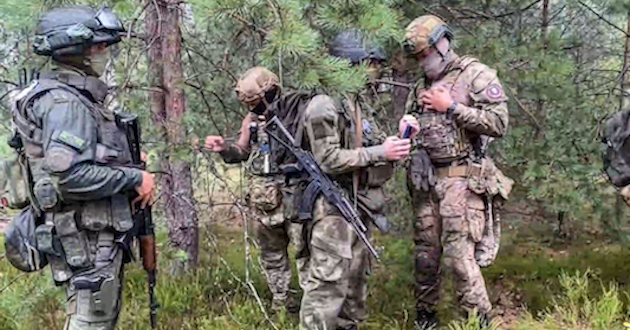As Russia’s war on Ukraine rages on, the U.S. Embassy in Belarus is urging Americans to leave “immediately”. The advisory comes as NATO members begin constructing physical barriers on their borders to cut off Belarus which is allied with Russia.
“U.S. citizens in Belarus should depart immediately,” a warning message from the U.S. Embassy in Minsk reads. “Consider departing via the remaining border crossings with Lithuania and Latvia, or by plane. U.S. citizens are not permitted to enter Poland overland from Belarus. Do not travel to Russia or to Ukraine.”
The embassy advisory also cited “the arbitrary enforcement of local laws, the potential of civil unrest, the risk of detention, and the Embassy’s limited ability to assist U.S. citizens residing in or traveling to Belarus” as reasons for its warning.
The Monday alert from the embassy warned that NATO member Lithuania is sealing off two of its border crossing points with Belarus. The embassy said four remaining Lithuanian-Belarusian border crossings remained open but that conditions could change. The U.S. embassy further warned that fellow NATO allies like Poland and Latvia will likely shut off border access with Belarus, leaving U.S. citizens with few options to leave the country.
The risk of Americans becoming stuck in Belarus is particularly high, given that the country borders Ukraine to the south and has supported Russian forces in invading that country.
“Do not travel to Belarus due to Belarusian authorities’ continued facilitation of Russia’s unprovoked attack on Ukraine, the buildup of Russian military forces in Belarus, the arbitrary enforcement of local laws, the potential of civil unrest, the risk of detention, and the Embassy’s limited ability to assist U.S. citizens residing in or traveling to Belarus,” the U.S. Embassy wrote in a travel advisory.
Americans who choose to travel to Belarus or remain in the country despite the embassy’s warnings have been advised to keep their passports and other travel documents with them at all times and have a contingency plan that does not rely on U.S. government assistance. They have also been advised to avoid known high-risk areas and to monitor local and international news for major updates.
Support independent, local journalism today. Metro Voice needs you.
The tensions between Belarus and its NATO neighbors have taken on a new dimension in recent weeks.
Last month, Poland deployed troops to its border with Belarus, citing the presence of Russian Wagner mercenary forces in the country. The Wagner forces relocated to Belarus after a short-lived mutiny with Russia. Belarusian President Alexander Lukashenko appeared to smooth over the strained relations between the Wagner forces and the Moscow government by agreeing to take in the mercenary army. Since then, Wagner forces have reportedly begun training Belarusian troops at a location near the Polish border, raising alarm bells in Warsaw.
“We assume the Wagners aren’t going to Belarus to recuperate but to carry out a mission,” Stanislaw Zaryn, Poland’s deputy minister coordinator of special services, said in early July. “This mission could be aimed at Poland but also against Lithuania or Ukraine.”
Poland deployed even more troops to its border with Belarus this month after Belarusian military helicopters allegedly violated Polish airspace, a claim the Lukashenko government has denied. It is beginning the process of also closing border crossings.
Latvia has also bolstered its troop presence along its border with Belarus, citing an alleged increase in the number of illegal immigrants entering the country from Belarus.
–Wire services
